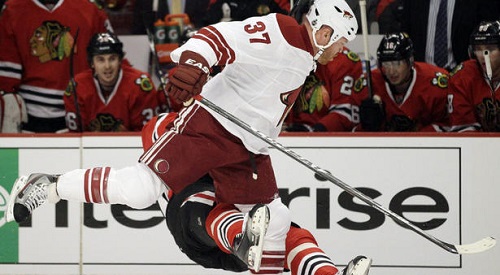
NHL considering expanded playoffs?
With CBA negotiations seemingly near an end, the NHL might be taking a cue from MLB.
Sportsnet’s Nick Kypreos reported on Tuesday night that both the NHL and NHLPA “have had internal discussions on four more teams qualifying for playoffs.”
Temper your expectations because it hasn’t even been negotiated between the two sides, but the idea could become the most important element of the CBA, at least from a fan’s perspective.
Speculation from some suggests the additional teams would most likely be added under a play-in (i.e. shortened) series or elimination game, similar to baseball’s wild card game. Under the current two-conference alignment, this could be as simple as having the eighth seed facing the ninth while the seventh- and tenth-seeds duel each other in each conference. Or, if the NHL realigns to four divisions or conferences, four separate battles between the various fourth and fifth seeds.
After having the game’s image battered during a draining and incomprehensible lockout, the rationale behind the altered playoff format is simple: generate excitement and generate money. Just think about how exciting a Game 7 is, then think about having multiple Game 7s to start the playoffs. If your name is Gary Bettman, there are dollar signs in your eyes.
Not only does the concept bring more drama to the playoffs, but the regular season as well. Playoff races have become incredibly exciting in recent years thanks to increased parity. With a one-game play-in, the playoff races would essentially double. There would be a race to finish sixth or higher, thus assuring a spot in the actual playoffs, and then there would be the race to get a winner-takes-all chance to make the actual playoffs.
[php snippet=1]
Based on the format’s success in baseball, there is no question regarding the appetite for more playoff action among sports fans. MLB’s one-game, winner-takes-all wild card playoff was a smashing success in 2012, with the two games averaging 4.6 million viewers, more than the entire 2011 Division Series, and a 61 percent increase from the first day of the 2011 playoffs.
Although the extra games would undoubtedly mean increased drama, the idea isn’t without its detractors. The main criticism against expanding the playoff pool is that it is already too easy to make the playoffs. The NHL, like the NBA, already allows more than half the teams in the league into the playoffs, whereas just 12 of 32 in the NFL and 10 of 30 in MLB advance past the regular season.
However, this criticism isn’t valid. As Tyler Dellow recently wrote, expanding the playoffs to 67 percent of the league isn’t without precedent. In fact, since the 1940s, the NHL has allowed at least that many teams to qualify in most years. Allowing 67 percent isn’t even a high figure; only five of the league’s 21 teams missed the playoffs in 1991. Limiting the playoff-bound teams to closer to 50 percent of the league is a relatively recent development. So unless the NHL has never got the playoffs right, an extra four teams isn’t a problem.
Furthermore, allowing additional teams isn’t problematic because even if it is becomes slightly easier to make the playoffs, the reward is still the most gruelling and difficult postseason in all of sports. Expanding it doesn’t make an easier road to the Stanley Cup; it makes it harder. While other playoff teams are resting and preparing, the play-in teams are battling in a do-or-die match, putting them at a disadvantage once the rest of the “regular” playoffs begin.
Finally, the criticism against expanding the playoffs is flawed because adding four teams isn’t really expanding the playoffs. It is better to characterize those four teams as wild card teams that have the chance to become playoff teams. Even if this new system is adopted there will only be 16 actual playoff teams.
More playoff teams is nothing more than a whisper right now, but it could be a final piece to the CBA that helps hockey fans forget that they swore off hockey during the lockout. And after going through many hockey-less nights during the lockout, isn’t more hockey a good thing?
[php snippet=1]

